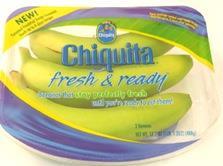
California-based food technology product supplier Landec Corporation, which manufactures speciality polymer products for a range of food products including fresh fruit and vegetables, says its programmes with leading fresh produce company Chiquita are progressing well on a number of fronts, with the company hoping to expand sales of its packaging technology to Chiquita and others during 2009.
However, the company has also revealed that the recent slowdown in the US economy has had a significant impact on its expected revenues and net income for the current financial year, prompting it to revise both downwards.
Chiquita already has a number of projects underway involving Landec solutions. As part of its Chiquita-To-Go convenience programme, Chiquita bananas in Landec packaging are being sold to coffee chains, convenience stores and mini-mart petrol stations. Chiquita is a major supplier of bananas to Starbucks for its new Vivanno banana smoothie range, and Chiquita-To-Go has also been launched in three European countries.
In the QSR arena, meanwhile, McDonald's is currently conducting regional market tests for banana products, including banana smoothies, using Chiquita-branded bananas delivered in Landec's BreatheWay packaging. 'We have been informed that the tests are going well,' said a spokesperson for Landec.
Chiquita avocados are also being shipped to foodservice customers and retail grocery chains in Landec's BreatheWay packaging.
However, retail grocery store advanced trials for bananas have reportedly been suspended, according to Landec. 'These been put on hold until such time that consumers are prepared to purchase innovative packaged bananas with longer shelf-life that are sold as a premium priced product,' said the spokesperson.
Landec has reported that its revenues for the first six months of fiscal year 2009 increased 7 per cent to US$129.8m compared with US$121.6m for the same period of the previous year.
Net income for the first six months, meanwhile, decreased to US$4.3m compared with US$6.2m for the year-earlier period.
According to Gary Steele, chairman and CEO of Landec, the company has recently felt the impact from the slumping US economy and the decline in consumer spending, particularly for high-care, fresh-cut products.
'For the six months ended 30 November 2008, we estimate that overall industry unit volume shipments in the fresh-cut vegetable category declined 6 per cent and this decline accelerated to 12 per cent during our second fiscal quarter,' he commented.
However, Mr Steele said that for both periods Landec had continued to increase its market share in the fresh-cut vegetable category. 'Our unit volume growth in the fresh-cut vegetable category increased 1 per cent for the six months ended 30 November 2008 and decreased 7 per cent during the second fiscal quarter of 2009 compared to the same periods last year, reflecting better results than the estimated category declines for each period.'
He continued: 'At this time, it is not possible to predict the direction of the fresh-cut vegetable category for the second half of our fiscal year but we are hopeful that recent declines in the category will level off in the near term and return to positive growth by the beginning of our fourth fiscal quarter.'
The company has also revised its original revenue and income targets for 2009 - originally set at 10 per cent and 15-20 per cent respectively – downwards. 'At this point in time, due to the uncertainty of the US economy and consumer spending, we cannot forecast with any degree of reliability our financial results for all of fiscal year 2009, except that we expect to generate net income and positive cash flow from operations,' stated Greg Skinner, Landec's chief financial officer. 'Our balance sheet remains very strong with over US$61m of cash and marketable securities and no debt.'
Apio Inc, a subsidiary of Landec, manages the group's foodbusiness throughthree business areas: value added, which includespre-cut speciality packaged vegetable products sold throughout NorthAmerica under the Eat Smart and private label brands to retail, clubstores and foodservice chains; Apio Tech, which sellsBreatheway membranes for use with fruit and vegetablepackaging solutions as well as large container packaging applications;and Apio's export business Cal-Ex Trading, which distributesand ships whole and packaged produce products to Asia.



